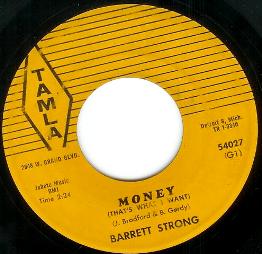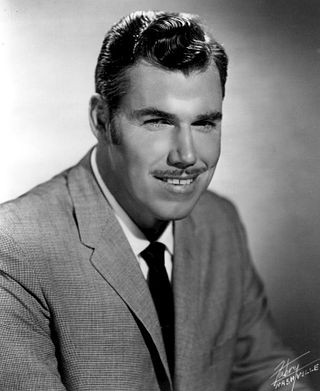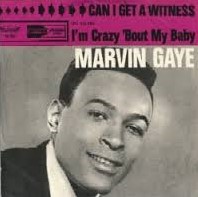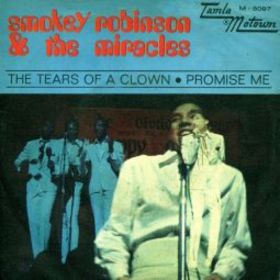Motown is an American record label owned by the Universal Music Group. Founded by Berry Gordy Jr. and Quincy Jones as Tamla Records on January 12, 1959, it was incorporated as Motown Record Corporation on April 14, 1960. Its name, a portmanteau of motor and town, has become a nickname for Detroit, where the label was originally headquartered.

Berry Gordy III, also known as Berry Gordy Jr., is an American retired record executive, record producer, songwriter, film and television producer. He is best known as the founder of the Motown record label and its subsidiaries, which was the highest-earning African-American business for decades.

"I Heard It Through the Grapevine" is a song written by Norman Whitfield and Barrett Strong for Motown Records in 1966. The first recording of the song to be released was produced by Whitfield for Gladys Knight & the Pips and released as a single in September 1967. It went to number one on the Billboard R&B Singles chart and number two on the Billboard Pop Singles chart and shortly became the biggest selling Motown single up to that time.

"Money (That's What I Want)" is a rhythm and blues song written by Tamla founder Berry Gordy and Janie Bradford, which was the first hit record for Gordy's Motown enterprise. Barrett Strong recorded it in 1959 as a single for the Tamla label, distributed nationally on Anna Records. Many artists later recorded the tune, including the Beatles in 1963 and the Flying Lizards in 1979.

Ottis Dewey "Slim" Whitman Jr. was an American country music singer and guitarist known for his yodeling abilities and his use of falsetto. Recorded figures show 70 million sales, during a career that spanned more than seven decades. His prolific output included more than 100 albums and around 500 recorded songs; these consisted of country music, contemporary gospel, Broadway show tunes, love songs, and standards. Soon after being signed, in the 1950s Whitman toured with Elvis Presley.

"Can I Get a Witness" is a song composed by Brian Holland, Lamont Dozier, and Eddie Holland and produced by Brian Holland and Lamont Dozier as a non-album single for American recording vocalist Marvin Gaye, who issued the record on Motown's Tamla imprint in September 1963.

"The Tears of a Clown" is a song written by Hank Cosby, Smokey Robinson, and Stevie Wonder and originally recorded by Smokey Robinson & the Miracles for the Tamla Records label subsidiary of Motown, first appearing on the 1967 album Make It Happen. The track was re-released in the United Kingdom as a single in July 1970, and it became a number-one hit on the UK Singles Chart for the week ending September 12, 1970. Subsequently, Motown released a partially re-recorded and completely remixed version as a single in the United States as well, where it quickly became a number-one hit on both the Billboard Hot 100 and R&B Singles charts.
"Hi-Lili, Hi-Lo" is a popular song with music by Bronislaw Kaper, and lyrics by Helen Deutsch. The song was published in 1952. The song was featured in the 1953 film Lili, starring Leslie Caron.

"Shop Around" is a song originally recorded by the Miracles on Motown Records' Tamla subsidiary label. It was written by Miracles lead singer Smokey Robinson and Motown Records founder Berry Gordy. It became a smash hit in 1960 when originally recorded by the Miracles, reaching number one on the Billboard R&B chart, number one on the Cashbox Top 100 Pop Chart, and number two on the Billboard Hot 100 chart. It was the Miracles' first million-selling hit record, and the first-million-selling hit for the Motown Record Corporation.

In the Groove is the eighth studio album by American soul musician Marvin Gaye, released on August 26, 1968, on the Motown-subsidiary label Tamla Records. It was the first solo studio album Gaye released in two years, in which during that interim, the singer had emerged as a successful duet partner with female R&B singers such as Kim Weston and Tammi Terrell. In the Groove was reissued and retitled as I Heard It Through the Grapevine after the unexpected success of Gaye's recording of the same name, which had been released as a single from the original album.
"For Once in My Life" is a song written by Ron Miller and Orlando Murden for Motown Records' Stein & Van Stock publishing company, and first recorded in 1965.

"The Most Beautiful Girl" is a song recorded by Charlie Rich and written by Billy Sherrill, Norro Wilson, and Rory Bourke. The countrypolitan ballad reached No. 1 in the United States in 1973 on three Billboard music charts: the pop chart, the country chart, and the adult contemporary chart, as well as in Canada on three RPM charts: the RPM 100 Top Singles chart, the Country Tracks chart, and the Adult Contemporary chart. Billboard ranked it as the No. 23 song for 1974.

Tammy and the Bachelor is a 1957 American romantic comedy film directed by Joseph Pevney and starring Debbie Reynolds as Tambrey "Tammy" Tyree, Walter Brennan as Grandpa Dinwitty and Leslie Nielsen as Peter Brent. It is the first of the four Tammy films. It was adapted from the 1948 novel Tammy Out of Time by Cid Ricketts Sumner.
"I've Been Good to You" is a 1961 R&B song by The Miracles on Motown Records' Tamla label. It was released as the B-side of their Billboard Top 40 hit, "What's So Good About Goodbye", and was included on their album I'll Try Something New the following year. This sad, melancholy ballad charted #103 on the Billboard Pop chart. Despite its relatively modest chart placing, this song has been hugely influential, and is noted as Beatle John Lennon's favorite Miracles tune, and was the inspiration for The Beatles' songs "This Boy" and "Sexy Sadie". Written by Miracles lead singer Smokey Robinson, the song begins with the lyric, "Look what you've done...You've made a fool out of someone..." which Lennon later paraphrased in Sexy Sadie song as, "What have you done...You've made a fool of everyone."
"Let Your Conscience Be Your Guide" is the debuting single for singer Marvin Gaye, released as Tamla 54041, in May 1961. It was also the first release off Gaye's debut album, The Soulful Moods of Marvin Gaye, in which most of the material was the singer's failed attempt at making an 'adult' record compared to Motown's younger R&B sound.

"Indian Love Call" is a popular song from Rose-Marie, a 1924 operetta-style Broadway musical with music by Rudolf Friml and Herbert Stothart, and book and lyrics by Otto Harbach and Oscar Hammerstein II. Originally written for Mary Ellis, the song achieved continued popularity under other artists and has been called Friml's best-remembered work.

Four In Blue is a 1969 album by the Motown R&B group the Miracles, issued on the label's Tamla Records subsidiary in the U.S., and the Tamla-Motown label elsewhere in the world,.
We've Come Too Far to End It Now was a 1972 single by Motown Records R&B group The Miracles on its Tamla Label subsidiary (T54220F) and taken from their 1972 album, Flying High Together, the group's final studio album with original lead singer Smokey Robinson. This song charted at #46 on the Billboard Pop Chart, and reached the Top 10 of its R&B chart, peaking at #9.
"Come to Me" is the debut single by American singer Marv Johnson. This tune was the first single to be released on the newly formed Tamla Records label, which eventually became a subdivision of the famed Motown label. It also became Johnson's first hit single after the song was nationally distributed by United Artists. It was recorded at United Sound Systems.
"Sail Along, Silv'ry Moon" is a song written by Harry Tobias and Percy Wenrich in 1937 and performed by Bing Crosby. It reached #4 on the U.S. pop chart in 1937. Outside of the US, the song peaked at #1 in Canada, Germany and Norway.











